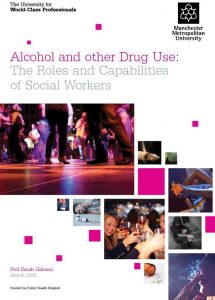My latest guest blogger, Professor Sarah Galvani, leads UK research on substance use in social work education and practice. Her work includes a focus on alcohol and other drug use in association with a range of social and health care issues. She is also a registered social worker with a practice background in adult services. The recent government announcement of additional support for children affected by alcohol dependent parents throws a light on the need to identify and support adults too, as Sarah now explains.

Professor Galvani: I can recall the honest and impassioned response of a newly qualified social worker (NQSW) who took part in our research on substance use in the social work curriculum.
She wrote how “angry” she was that she was “not adequately prepared” by her qualifying programme for the “realities of front line practice” with children and families - particularly in relation to substance use, domestic violence and mental health. Her work bought her into contact with parents with problematic substance use repeatedly but she didn’t know how to respond.
While I wholeheartedly welcome the news of additional funding targeting children and young people affected by parental problematic substance use – and by ‘substance use’ I mean alcohol and other drugs – we need to look closer to home to see what we, as social workers, can do to support the adults in their lives.
With alcohol-related harm among older people increasing, increasing drug use among older populations, and growing awareness of the abuse of prescribed medication, this is not just about younger adults and their young children. It is also about the grandparents, carers, aunts, uncles and other adults in the lives of these young people who are suffering harm from intoxicated adults.
 Of course, we must support children and young people better. I hope that the recently announced funding will bring relief and support to at least a proportion of children and young people who experience abuse and neglect as a result of problematic substance use by parents or carers.
Of course, we must support children and young people better. I hope that the recently announced funding will bring relief and support to at least a proportion of children and young people who experience abuse and neglect as a result of problematic substance use by parents or carers.
It is overdue and desperately needed. But we also need to work with the adults. As social workers, we need to support the adults in these young people’s lives and to be, at very least, ‘adequately’ prepared to do so, if not well prepared.
Support services for those children and young people affected are important, but so too are the substance use services that try to prevent that harm in the first place. These are the services that work with the adults, the parents, and are the very services that are in crisis as a result of budget cuts.
At this time, it is more important than ever that we, as social workers, do everything we can to stop or reduce harm related to problematic substance use. To date we haven’t. This is not the fault of social workers, but the fault of a profession that has failed to understand, and then convey, our role in supporting people with problematic substance use.
In 2015, with funding from Public Health England, a group of social work, social care, and health colleagues met to clarify the roles and capabilities of social workers, whatever their specialism, in supporting people with problematic substance use. Three key roles emerged from the consultation. Social workers should:
- Engage with the topic of substance use as part of their duty of care to service users, families and dependents.
- Motivate people to change their problematic substance using behaviour and support them in their efforts. This requires a strong skill set in communication and motivation
- Support people in their efforts to make and maintain changes in their substance use. It isn’t over when someone receives specialist intervention; the hardest part is often maintaining the change. Ask any who has tried to lose weight or give up smoking.
For further information on the roles and capabilities of social workers, please click here.
While knowledge of the impact of substances is important, and this is reflected in the Knowledge and Skills Statements, it is the skills to engage people in conversation about substance use, to conduct a preliminary assessment, and to know how to access specialist help, that need to be the primary focus of substance use education in social work.
Most of us will have people in our lives who have suffered as a result of problematic substance use – their own or someone else’s. In my personal life, I have witnessed, and cried for, friends I grew up with whose young lives were normalised around combinations of problematic substance use and domestic abuse.
As an adult, I continue to love, support, and observe people in my private life whose substance use is problematic in some way – often health related, but also social problems, family conflict, employment crises, financial worries.
We need to make sure we are ready to play our part in reaching out to people with substance problems. We need to show both empathy and care about what happens to them, as well as their children. The research show that it is the relationship with the practitioner that helps people most and that is what social workers do best.
Leave a comment